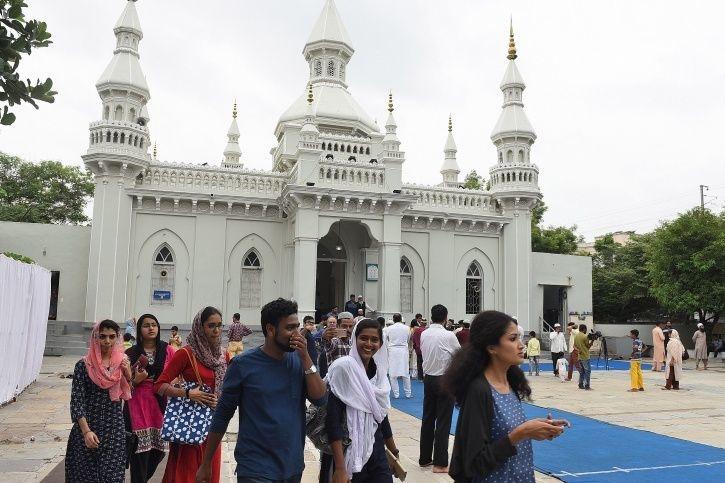It was the first time in many years that the mosque at Azam Campus, an educational hub in Pune, opened its doors to men and women from other communities. The idea was to allay doubts and dispel misconceptions around the religion and its practices.

Representation Image
Pune: A mosque in Pune held a ‘Visit Our Mosque’ programme in December last year wherein people from other religions were given a tour of the Islamic place of worship at the Azam Campus Mosque.
The two-day programme was organised by the Islamic Information Centre, Pune (PIIC), to promote harmony and goodwill
Around 350 people visited the mosque through the programme. Reports suggested that it was the first time in many years that the mosque at Azam Campus, an educational hub, opened its doors to men and women from other communities. The idea was to allay doubts and dispel misconceptions around the religion and its practices.
“It is an initiative that is slowly gathering strength across the country. Apart from the Pune mosque, Al-Fukran in Mumbra (Mumbai), Masjid Umar Bin Khattab in Ahmedabad and three mosques in Hyderabad including the well-known Spanish Mosque have opened their doors for anyone interested in paying a visit,” a report by Times of India said.
According to the report, the trend started abroad. Mosques in the UK have been holding open days for decades, but a concerted effort started in February 2015 when as part of #VisitMyMosque, 20 mosques held an open house on the same day. Since then, 200 mosques have joined the UK initiative. Similar campaigns are running in Canada and the US.
Karimuddin Sheikh of PIIC, who helped organise the weekend open house, knows the challenge he is up against. It is a toxic atmosphere stoked by fake social media forwards that allege mosques spread violence and hatred, and madrassas breed terrorists. The organisers tackled rumours spread through social media head-on with placards depicting the consequences of spreading unverified news, the report said.
“Sheikh, who owns a sportswear manufacturing business, noticed the change in people’s attitude some years earlier when he went looking for a home to rent and was refused repeatedly. “Over the last six years, we have organised inter-faith dialogues and seminars on festive occasions hoping to begin conversations. But the hatred spewed by social media has just taken over young people’s minds,” he says. People would ask him, “Why aren’t mosques open for everyone? What are you hiding?” “We felt that we had to take a more drastic step,” he said in the report.
Moinuddin Nasrullah, the trustee of the Umar Bin Khattab mosque in Ahmedabad, has encountered the ugly face of prejudice often. He recounts how an elderly man walked away from him at a book fair saying, “ Tum logon se jitni doori banai jaye utni achchi hai (It’s best to keep a distance from people like you).” The comment stung but also left Nasrullah reflecting about what to do. It took a year but the mosque hosted its ‘Visit My Mosque’ programme last month, TOI reported.
Nasrullah is trying to bring his community closer to the people. The mosque is active on Facebook and Twitter and posts pictures and videos of the open house and teachings of the Quran. Nasrullah hopes to inspire other mosques to use social media and increase public interaction.
Many who had never been inside a mosque or read about Islam were surprised to find that namaz was read facing a wall and not in front of an idol. Arabic teacher Kubra Naik says that despite living together for so many years, awareness levels are still low. “People don’t really know each other. When I tell people my name or they see me in a hijab, I know they have reservations about what I am going to say. But when I speak about how it is important for us to live in peace their attitude changes,” she said in the report.
Naik is a volunteer with the NGO A Little Kindness Trust, that has conducted open days in three mosques in Hyderabad. The most successful gathering was at the Spanish Mosque in August 2018, when over 2,000 people turned up.
Harsh Mander, who started the Karvaan-e-Mohabbat project as an outreach for Muslim victims of lynchings and riots, says the effort is touching but it must be the majority community that reaches out to others. “The worrying part is that the present climate has legitimised bigotry. The more educated, more privileged Indians are far more prejudiced than those who are less educated,” he said in the report.
The organisers are hopeful about an impact. “Pune’s Karimuddin has plans to hold another open house in February while Nasrullah has been getting calls from other mosques in Gujarat for advice. “ Mahol ko badalna hoga, aur humme hi kuch karna hoga (Things have to change and we have to take the initiative),” Nasrullah said in the report.
Originally published in The Times of India.